AMD Radeon HD 7950 Review Feat. Sapphire & XFX: Sewing Up The High-End Market
by Ryan Smith on January 31, 2012 9:02 AM ESTOverclocking: Power, Temp, & Noise
In their marketing materials AMD is heavily pushing overclocking, and they have good reason to. With the 7970 we’ve established that Tahiti has quite a bit of overclocking headroom, and as the 7950 is clocked lower by default this opens up that headroom even further. Realistically AMD’s binning process means that the best clocking Tahiti GPUs are going to be allocated to the 7970 unless they have failed shaders, but even with that there’s quite a bit of potential on paper.
As with overclocking the 7970, our goal overclocking the 7950 is to see how much you can get for free; that is without any voltage adjustments. AMD’s reference PCBs are not particularly overbuilt for overclocking—cards like that will come later—so sticking to the reference voltage is the safest option, not to mention the easiest. With the 7970 we were able to get 200MHz (22%) overclocks without any voltage adjustment, and we’re hoping for the same out of the 7950.
With that said, we quickly ran into a wall on one card: the Sapphire 7950. Sapphire’s low VID of 0.993v may be great for temperature and noise at stock, but it’s not doing overclocking any favors. We only hit 950MHz at that voltage. As the Sapphire was the odd man out—every other card was at 1.093v—we did end up overvolting the Sapphire to 1.093v to see what it was capable of when put on similar footing as the rest of our cards.
After bringing up the voltage of our Sapphire card, all of our 7950s ended up overclocking to very similar levels. Our Sapphire and AMD cards topped out at 1025MHz core, a 225MHz (28%) overclock over a stock 7950 and a 125MHz (14%) overclock over the Sapphire’s factory overclock, while our XFX card reached 1050MHz, a 150MHz (17%) overclock beyond XFX’s factory overclock. Meanwhile the memory clocks on all of our cards topped out at 5.8GHz, beyond which we’d start seeing performance regressions from error correction on the memory bus.
| Radeon HD 7950 Overclocking | |||||
| AMD Radeon HD 7950 | Sapphire HD 7950 Overclock Edition | XFX R7950 BEDD | |||
| Shipping Core Clock | 800MHz | 900MHz | 900MHz | ||
| Shipping Memory Clock | 5GHz | 5GHz | 5.5GHz | ||
| Shipping Voltage | 1.093v | 0.993v | 1.093v | ||
| Overclock Core Clock | 1025MHz | 1025MHz | 1050MHz | ||
| Overclock Memory Clock | 5.8GHz | 5.8GHz | 5.8GHz | ||
| Overclock Voltage | 1.093v | 1.093v | 1.093v | ||
As you can imagine, with such similar overclocks, gaming performance on all 4 cards ended up being very similar. So we’ll get to gaming performance in a minute, while we’ll start with power, temperature, & noise.
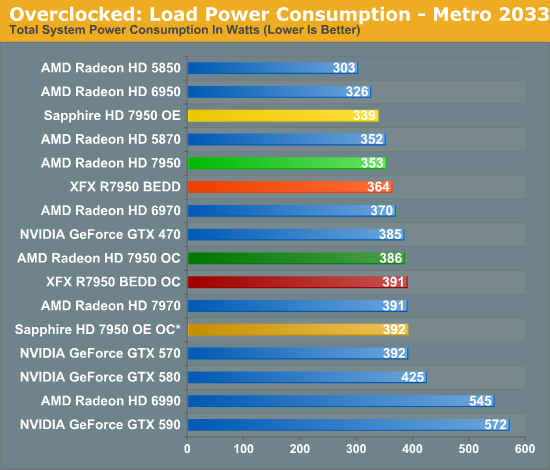
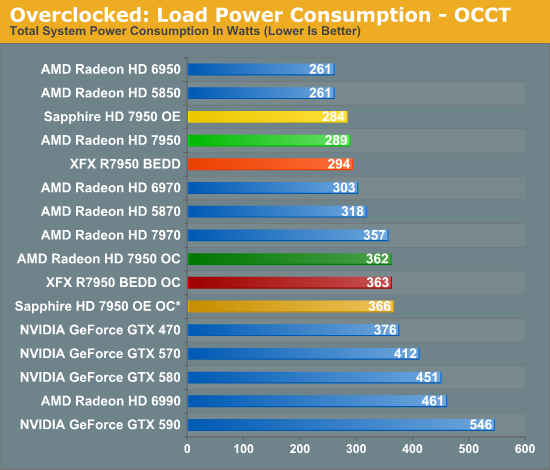
Even though we’re not increasing the voltage on our AMD and XFX cards, merely overclocking them and raising the PowerTune limit to avoid throttling does drive the power consumption up. As is typical with heavily overclocked cards, overclocking quickly drives up power consumption and the 7950s are no exception. After overclocking power consumption is almost identical to the stock 7970, so while you can get 7970 performance you still need to pay the price with 7970 power consumption. Meanwhile it’s interesting to note that even with the extra 0.1v we’ve given the Sapphire card its final power consumption is only ever so slightly higher than the other 7950s, proving that voltage is the great equalizer in this case.
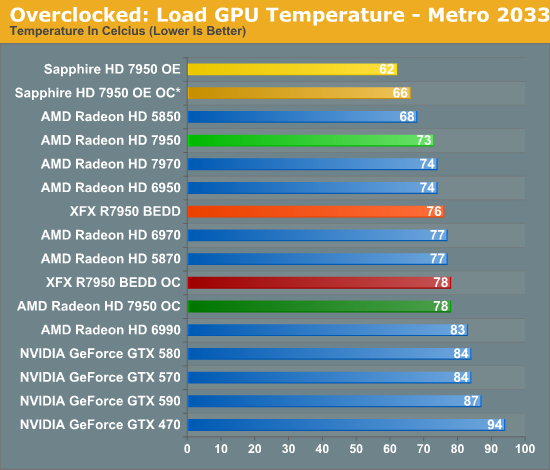
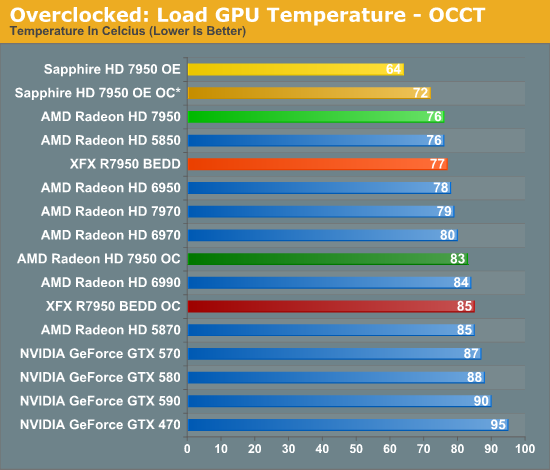
With the increase in power comes an increase in temperatures. The Sapphire card still does very well here staying in the low 70s even under OCCT, while the reference and XFX cards hit the high 70s under Metro and mid 80s under OCCT. As we’ve yet to really ascertain what the thermal limits are for Tahiti, it’s not clear whether there’s too much thermal headroom left for the GPU, particularly under OCCT.
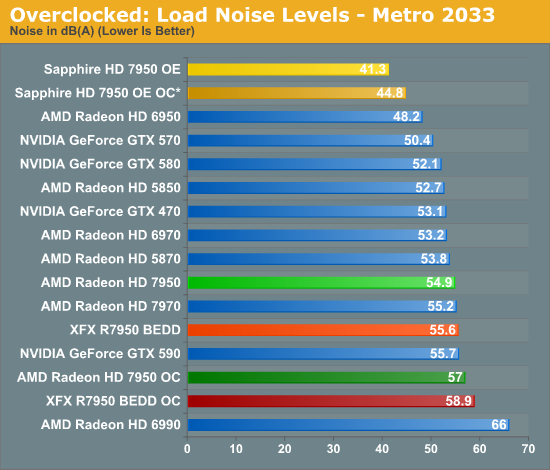
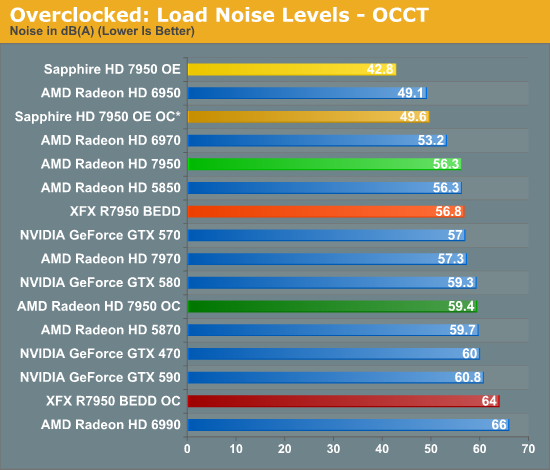
Last but not least we have load noise. The Sapphire card is once more a stellar performer, and we still can’t get it above 50dB even with OCCT. Unfortunately the XFX 7950 BEDD has its biggest fallout yet—it may be able to overclock well, but at 64dB under OCCT the performance isn’t going to be worth the immense amount of noise it creates to move enough air to keep the GPU cool.










259 Comments
View All Comments
Galidou - Sunday, February 5, 2012 - link
Everyone is against you but still after all that, you continue to beleive in whatever nonsense you say from the beginning. Not even one person in here supported your opinions, whatever the market is, it just means one thing, you are a selfish nvidia HARDCORE fanboy who gets paid by the green goblin to speak your nonsense.....AMD fanboys are intense at times, but you clearly are a madman, the world would say you're wrong that you'd still beleive you're better than everyone else, but if you were, you'd be rich and not spending your time speaking on forums like this one.
SlyNine - Sunday, February 5, 2012 - link
You're kidding right rarson.What metric do you think we should use to determine value if not through precedence.
If you're questioning using precedent as a metering stick for value. Hell even the legal system uses precedents to try and determine law, but to you it's not good enough for video cards.
SlyNine - Sunday, February 5, 2012 - link
yea based on old nods. new nods bring cheaper parts with better performence. THATS WHAT THIS IS ALL ABOUT!!!!!!!!!!!!!!!!!!!!!!!!!!!!!!!!!!!!SlyNine - Sunday, February 5, 2012 - link
So the 5870 was priced according to the competition.No you're full of shit because new cards always bring better performence for the price.
SlyNine - Sunday, February 5, 2012 - link
Actually you fail to use logic plenty of times in your arguments. Also I call your consistency in to question.Like for instance, the simple fact that new nods= cheaper performence, not better performence that scales with price.
Not sure why you cannot get that simple bit of logic figured out.
Deo Domuique - Wednesday, February 8, 2012 - link
Hey chizow, your comments kept me eventually away from buying the 7950. I use 12 years gaming PCs and always I had Nvidia. This time would be the first that I'd go to AMD's camp.Although, I already had too many concerns ( especially the high price ), I could't keep myself. But finally, I did. I'll wait for Kepler. If the 7950's price currently was 320-330€ and not 410€, right now I'd have already the card.
Apis - Sunday, April 22, 2012 - link
They are currently dropping the prices for the 7xxx series, I'm found one sapphire 7950 3gb for 360€ when looking right now.Apis - Sunday, April 22, 2012 - link
In this "Compute: Civilization V" benchmark Radeon HD 5870 got 154.9 FPSIn the 6970 review, http://www.anandtech.com/show/4061/amds-radeon-hd-... the 5870 got 181.9 FPS.
Why the regression?
Wolfpup - Friday, July 20, 2012 - link
Traditionally Nvidia's hardware has smashed AMD's for Folding, but it looks like PROBABLY the 7970 and 7950 should be respectable with the new architecture...I can't actually find ANYONE talking about the issue though or benchmarking...